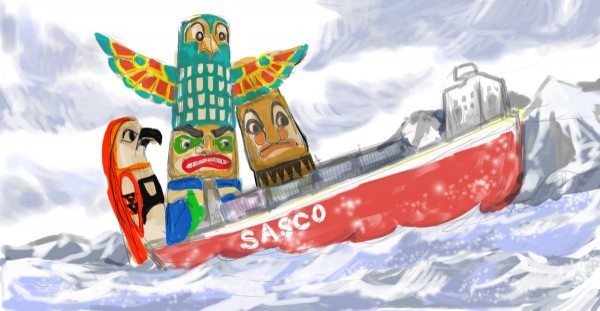
Nora Wu (graphic)
On Oct. 17, I spent an entire class refreshing a CBC web page every five minutes. As a proud Haida Gwaiian, it was hard for me to pay attention to my afternoon lecture knowing there was a 135-metre cargo ship floating free just a few miles off the west coast of the island. With the ongoing fight against Enbridge and the Northern Gateway pipeline, this felt like a nightmare was coming true.
Last weekend, the Russian ship Simushir lost power off the coast of Haida Gwaii during brutal weather conditions. The ship was approximately one-third the size of the oil supertankers that Enbridge has proposed.
Carrying hazardous mining cargo, 400 tons of bunker fuel, and 50 tons of diesel, the Simushir, even just as a mere cargo ship, was a huge threat to the islands. As I was refreshing the CBC news page, and saw that the ship was expected to run aground within a few hours and the nearest coast guard was approximately 20 hours away, I remember thinking to myself that there was no possible happy ending—this was going to be a disaster.
In my panic and pessimism, I thought that if the ship didn’t spill in the rough waters, it would hit the rocks before responders could act. Thankfully, the Gordon Reid, a Canadian coast guard boat, made it to the scene and was able to tether a line to keep the ship from running aground. Despite line breakages and worsening weather, the Gordon Reid was able to keep the powerless vessel in place until the Barbara Foss, a U.S. tugboat, arrived on-scene. The tug began towing the Simushir around the island, through the Hecate Strait, and to the port in Prince Rupert.
So, disaster averted, right? Can we just forget this ever happened? No.
Although, along with everyone on Haida Gwaii, I am incredibly grateful to those who put themselves at risk to prevent the near-disaster, we still must recognize that these circumstances were by no means world class. I see the federal and provincial governments’ take on this going one of two ways: either we will be told that the response is clearly adequate because everything worked out in the end, or they will promise improvement to prevent this happening again.
The second lesson learnt from this situation, something coastal communities have stated repeatedly, is what we must emphasize: these waters are not suitable for tanker traffic. This is why we refuse oil supertankers through the north coast, and this is why we need to assess the LNG projects that would introduce hundreds of tankers through our waters every year.
Given that the Simushir was minuscule in size compared to the tankers Enbridge is proposing, and that the 5-7 metre seas it was stuck in are mere ripples compared to what the Hecate Strait can see, the incident taught others what we on Haida Gwaii already knew: no pipeline, no tankers, no problem.






